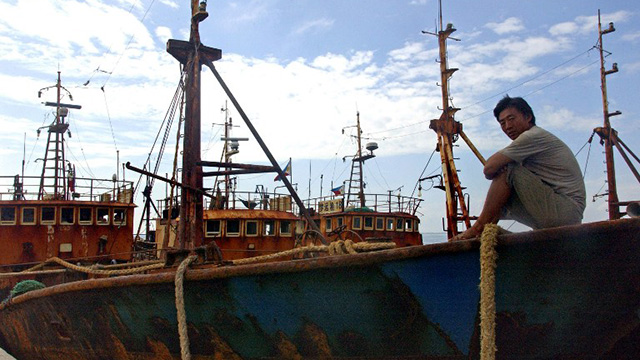SUMMARY
This is AI generated summarization, which may have errors. For context, always refer to the full article.

Putting the issue of poaching and its huge economic and environmental costs in the spotlight is one of the positive unintended consequences of the simmering Manila-Taipei row over a fishing mishap that occurred off northern Philippine waters in May.
The incident highlighted the country’s vulnerability to foreign intrusion, given its long coastline and numerous islands. Add to this an underdeveloped local fishing industry and weak maritime law enforcement.
For local fishermen, maritime law enforcement agencies and environmental activists, generating sympathy and support for the arrest of foreign illegal fishing is one of the upsides of the May 9 incident.
At home in PH waters?
Foreign poaching is rampant not only in the country’s hardly policed Exclusive Economic Zones, but even within its near-coastal waters. In Palawan, for one, a 2004 study by Benavente-Villena and Pido revealed that 38% of foreign illegal fishing is concentrated in Balabac and 11% in Tubbataha, a declared UNESCO World Heritage Site and the country’s only national marine park.
In Region 2, many foreign fishing vessels were caught fishing well within the municipal waters of Batanes and offshore Cagayan and Isabela. Foreign poachers have also been known for using local fisherfolks, such as those based in Babuyan Claro, to elude arrest. Perhaps such was the comfort level enjoyed by foreign poachers in Philippine waters that bursts of active anti-foreign illegal fishing campaigns caught them off guard.
Through years of illegally benefiting from the marine wealth of the Philippines, foreign poachers may have bribed their way into developing social networks and contacts with concerned government agencies. Some foreign poachers were caught in possession of forged or tampered fishing permits or licenses, which suggest that they may have links with some unscrupulous members of local maritime authorities.
The fight to end the culture of impunity among these foreign poachers therefore goes beyond supporting local fishermen and enhancing maritime law enforcement projection.
Economic sabotage
While many groups have already actively campaigned against foreign illegal fishing in the Philippines, the issue has never been mainstreamed and has not been able to garner as much public and state attention compared to the level of importance it is getting in other countries, including our neighbors.
Translating the adverse economic impact of foreign poaching into numbers may, perhaps, raise more awareness about the gravity of the situation and the need to respond to the same.
Roughly 71,400 metric tons of captured fisheries with an estimated value of P7.1 billion are lost every year from poaching. A 2008 APEC Fisheries Working Group study found that 90% of foreign vessels operating in Philippine waters are engaged in illegal fishing — contrary to the claims of many who argued that they were just innocently passing by.
In Region 2, BFAR estimates economic loss at US$37,000-$75,000 per foreign fishing vessel. Thus, over time, and especially in light of the continued increase of foreign illegal fishing, the country stands to lose a lot if this activity continues unabated.
Aside from the obvious revenue loss from the sale of fish caught in Philippine waters, the country also loses revenue that could have been generated from post harvest facilities and port services. These could have come from fish been brought to domestic ports for ice storage, processing, or transport to local and overseas markets.
Finally, such staggering loss also does great damage to the livelihood of many local fisherfolk, who remain among the country’s poorest socioeconomic classes.

Environmental damage
Foreign illegal fishing also causes serious ecological harm, contributing to the depletion of local fish stocks and destruction of marine habitats. In Region 2, coral harvesting, use of cyanide, dynamite and compressor, as well as collection of endangered or legally protected marine species, as well as bonsai specimens, were documented.
One of the charges against Chinese poachers about to be apprehended by Philippine maritime authorities in Bajo de Masinloc in April 2012 was the harvesting of corals, giant clams and live baby sharks. This sparked a standoff that lasted months.
And just recently, again in Tubbataha, hundreds of dead pangolins were recovered from a stranded Chinese fishing vessel, suggesting that foreign poachers have also been engaging in illicit wildlife trade and trafficking.
Ending the impunity
Addressing foreign illegal fishing takes a serious and sustained commitment. It is a comprehensive approach that requires the coordination of local communities, LGUs, maritime law enforcement units, courts, and the executive branch, including the foreign affairs department.
While the inadequate hardware of maritime law enforcers is apparent and should be gradually attended to, other important factors also need proper attention. One is the low conviction rate of foreign illegal fishermen. In Palawan, of the more than 1,000 arrested, only 24 served time in jail. Plea bargaining is also another issue.
Likewise, foreign embassies intercede quickly in behalf of their arrested citizens to issue certificates of indigency/bankruptcy, arguing that their fishermen cannot afford the fines for their misdeeds.
Many of them were immediately deported to their countries. And as the attraction of a bountiful catch far outweighs the cost of local penalties, many of these foreign illegal fishermen are lured back to the Philippines to fish again. Many cases of repeat offenders will attest to this.
The use and mobilization of apprehended illegal foreign fishing vessels should also be strongly considered. Allowing these ships to be returned to foreign illegal fishermen will only allow the cycle to continue. Instead, such vessels should be turned over to remote island communities, especially those in the frontline of anti-foreign poaching campaigns, for use in transporting needed supplies such as food and medicine.
Maintaining harmonious relations with neighbors should not come at the expense of the country’s rich marine resources. Countries which show leniency will be a magnet for foreign illegal fishermen under pressure from overfishing in their home countries and who are unable to penetrate neighbors with stricter maritime law enforcement regimes.
The Philippines should act as a responsible member of the international community, willing to listen to humanitarian appeals. But it should also honor its own laws, protect the interests of its own people, especially its fisherfolk, and conserve its rich marine endowment for future Filipino generations.
The Philippine government should exercise more political will to discourage foreign illegal fishermen. It should not make poaching fun in the Philippines. – Rappler.com
Lucio Blanco Pitlo III is a Research Assistant at the University of the Philippines Asian Center, where he is also taking up his MA in Asian Studies. His commentaries also appear in Forging a New Philippine Foreign Policy, among others. The views expressed here are the author’s own. He can be reached at lucioatacup@rocketmail.com
Add a comment
How does this make you feel?
There are no comments yet. Add your comment to start the conversation.